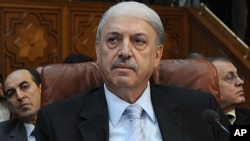|
A breakdown of Arab League's Syria proposal:
|
The Arab League says Syria has agreed to a plan aimed at ending months of violence during a government crackdown on dissent. But opponents, including protesters outside an emergency meeting in Cairo, remain skeptical of any promise by the Syrian government. Even as the diplomats were meeting, Syrian activists said another 31 people were killed in mounting violence.
The Arab League's Secretary-general, Nabil el-Araby, called the deal "a paradigm shift" in the Syrian crisis, while Qatar's foreign minister said what is needed now is for Syria to carry it out.
Sheikh Hamad bin Jassim bin Jabir Al-Thani said the agreement will help calm conditions and solve the crisis, adding he hopes there is "a serious application" on Syria's part.
The Arab League plan calls for the withdrawal of Syria's army and armed personnel from the streets, an end to violence against protesters, and an immediate release of political prisoners. It also calls for a dialogue between the Syrian government and its opponents, league monitoring of progress, and for foreign journalists to be allowed into the country.
Syria apparently dropped several objections to the deal, including meeting with members of the opposition outside of Syria. Talks are now set to begin in two weeks in Cairo.
But it is far from clear if the government will meet with opponents insisting on President Bashar al-Assad's departure. The Syrian government has repeatedly called a wide swath of the protesters "terrorists" backed by foreign powers and ruled out talking with them.
The government had also opposed withdrawing security forces, arguing no country could pull back all its security presence.
Arab League officials conceded they could give no guarantees that Syria will carry through with the plan, but promised to follow up with the matter.
The Qatari foreign minister said the Arab League would not threaten anything, but noted the league is in permanent session and would call another meeting should that be needed.
For some, the lack of teeth in the league proposal, combined with past, unmet promises by Syria to reform, render the deal suspect.
Nadim Shehadi is a Syria expert at the London-based Chatham House:
"It's time to acknowledge that the Syrian regime is not acknowledging what is happening in the country and is not intending to make any reforms," said Shehadi. "So it is, in a way, playing games and trying to delay matters, because it knows that is the only way forward with the international community."
Western leaders have condemned Syria's crackdown but have been reluctant to threaten any military intervention as they did in Libya with a NATO air mission.















